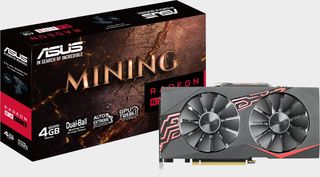Asus still thinks it’s a good idea to mine cryptocurrency with your GPU (it’s not)
Late to the party.

Asus sure does have some funny (read: bad) timing. The company has partnered with Quantum Cloud, a startup that developed a cloud-based cryptocurrency mining platform, to push the idea that gamers can generate extra income by donating their spare GPU cycles.
As Asus explains on some of its GPU product pages: "Quantum Cloud is a simple and secure service that lets you effortlessly earn extra money by putting your idle GPU to work. Through an easy-to-use app, your computer can help run cloud-based applications, making you money in the process."
Any earnings you make get automatically transferred to your WeChat or PayPal account, with the promise that "privacy remains intact because no personal data is stored online." Sounds great, right? There's only one little (big, actually) problem—the cryptocurrency market has basically tanked.
Simplifying the business of mining digital currencies (in this case, Quantum Dots) and tapping into spare GPU cycles would be great ideas...if this was 2017. But we're at the tail end of 2018, and the landscape is decidedly different now.
As Wes reported in August, many cryptocurrencies lost 90 percent of their value since the beginning the year. Ethereum, for example, was worth more than $1,400 at the beginning of the year and has since plummeted to $113 (current value). Ouch.
Earlier this week, Samuel noted that Bitcoin had fallen to below $4,000, a drop of around 30 percent on the week and down 75 percent on the year to date. Bitcoin is trading at its lowest value since September of last year.
Granted, Bitcoin is mined with ASIC hardware these days and not GPUs, but it's common practice to convert other digital currencies into Bitcoin. So, it's all related. It's also having an effect on GPU sales.
The biggest gaming news, reviews and hardware deals
Keep up to date with the most important stories and the best deals, as picked by the PC Gamer team.
"Gaming revenue was short of our expectations, and our fourth quarter outlook is impacted by excess channel inventory of midrange Pascal products," Nvidia said earlier this month.
While Nvidia expects to rebound, the company's CEO Jensen Huang described this period to MarketWatch as a "crypto-hangover." One thing I know about hangovers is that the remedy is not to consume more of what caused it in the first place, yet that's what Asus and Quantum Cloud are pushing.
If you want to try your luck with it anyway, you can head to Quantum Dot's website and download its installer. The company says a typical scenario would be a gaming PC with a GeForce GTX 1070 inside, which could generate around 20,000 Quantum Dots per day. Your cut in that scenario would be $10 for the month, though obviously that's not guaranteed. There's also the cost of power to consider.
Paul has been playing PC games and raking his knuckles on computer hardware since the Commodore 64. He does not have any tattoos, but thinks it would be cool to get one that reads LOAD"*",8,1. In his off time, he rides motorcycles and wrestles alligators (only one of those is true).
Most Popular






